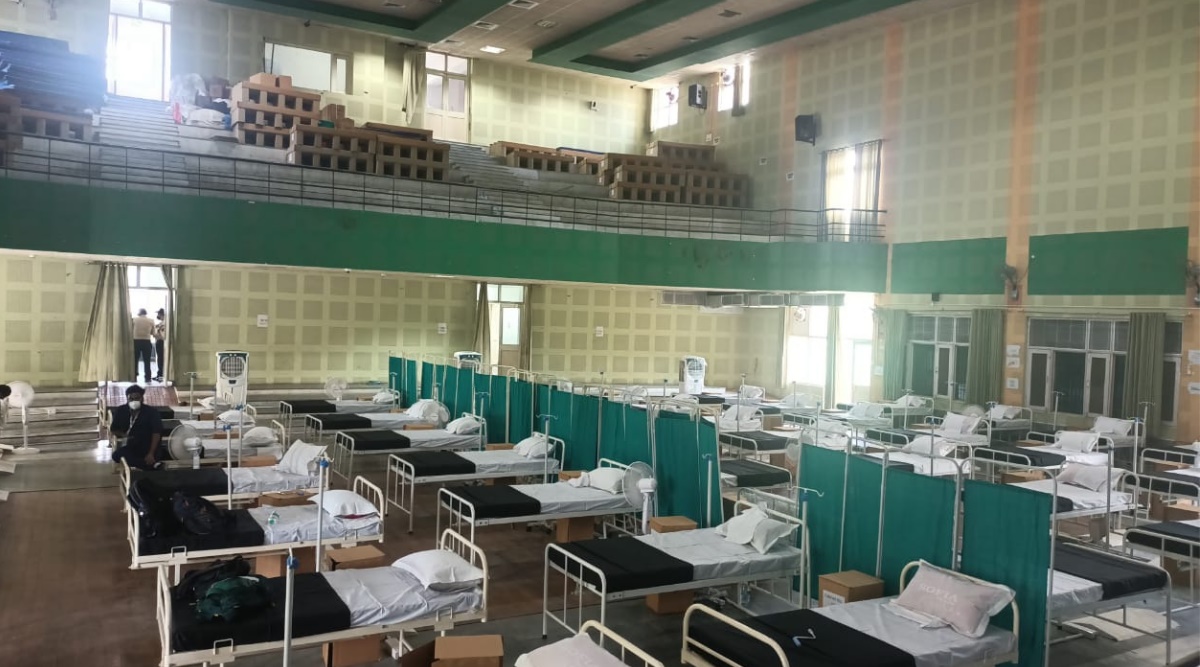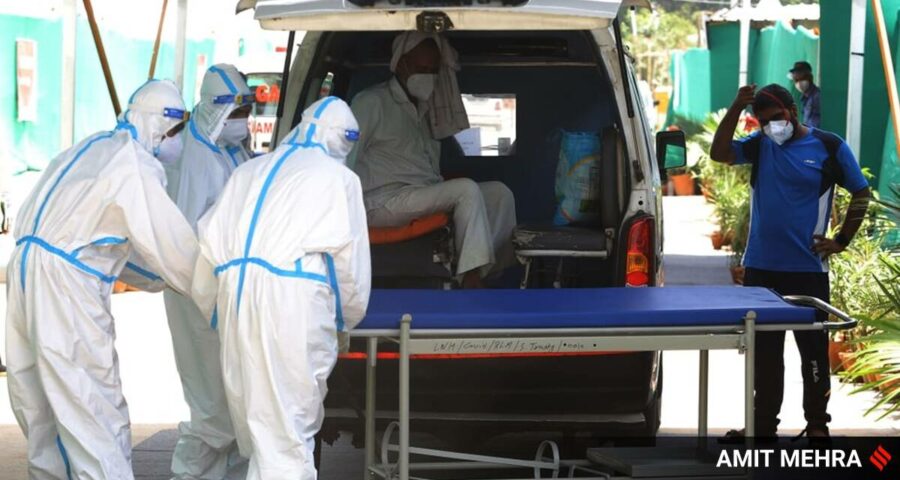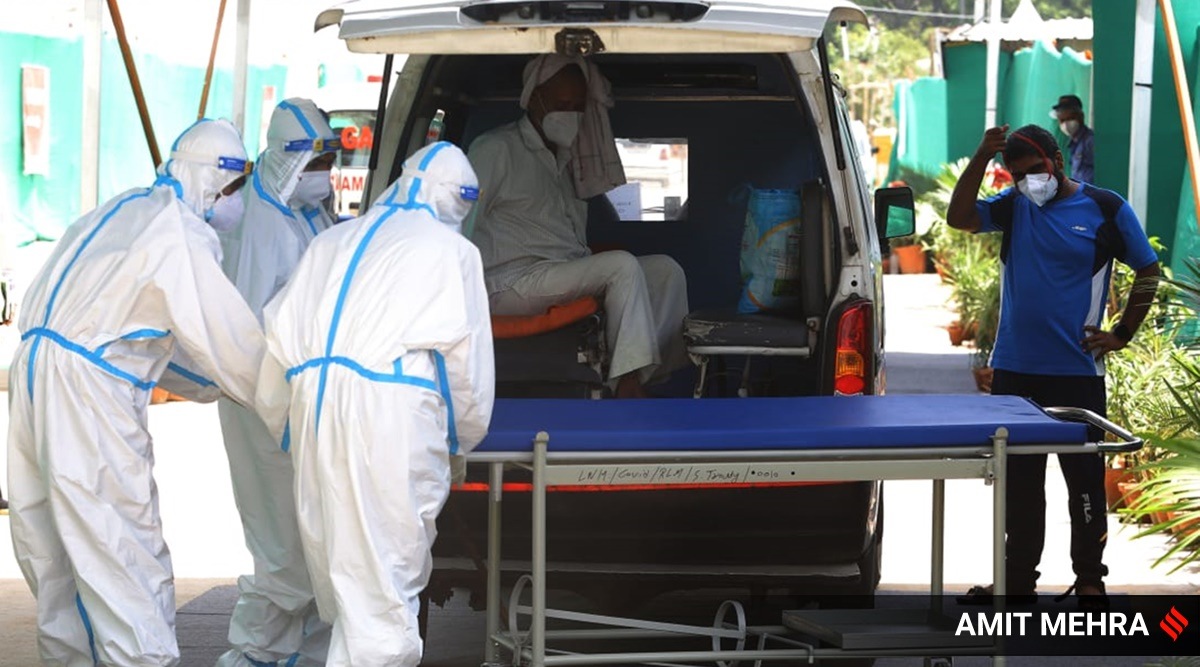Coronavirus (Covid-19) India Lockdown and Cases News Live Updates: Bharat Biotech says its Covid-19 vaccine 'Covaxin' has been found to be effective against the coronavirus strains found in India and the United Kingdom.
Coronavirus India Live updates: The pandemic situation in Uttar Pradesh is not alarming or out of control, Chief Minister Yogi Adityanath said on Sunday. UP is even prepared for a third wave of Covid-19, if it comes, Adityanath said. “We are hiding nothing. Everything is transparent… Every detail of testing, recoveries and deaths are uploaded on the (government’s Covid) portal,” Adityanath told a group of reporters in Noida.
Meanwhile, Bharat Biotech on Sunday said its Covid-19 vaccine ‘Covaxin’ has been found to be effective against coronavirus strains found in India and the UK. Citing a study published in peer-reviewed medical journal Clinical Infectious Diseases, the Hyderabad-based vaccine major noted that vaccination with Covaxin produced neutralising titres against all key emerging variants tested, including B.1.617 and B.1.1.7, first identified in India and the UK, respectively.
Delhi Chief Minister Arvind Kejriwal, on the other hand, also announced on Sunday that the lockdown in the National Capital has been extended by another week till May 24. “We are extending the lockdown for one more week. Instead of tomorrow, lockdown is extended till next Monday, 5 am in Delhi,” he said.
Prime Minister Narendra Modi also called upon the Chief Ministers of Rajasthan, Uttar Pradesh and Chhattisgarh to discuss the Covid situation in their respective states.
Coronavirus India LIVE updates: Delhi extends lockdown till May 24; India’s daily positivity rate drops to to 16.98 per cent from 24.47 per cent on May 3; Congress MP Rajeev Satav passes away; Follow latest updates here
India, on Sunday, tested 15,73,515 samples for Covid-19. To date, 31,64,23,658 samples have been tested, the Indian Council of Medical Research informed. (ANI)
The National Health Authority (NHA) has introduced restrictions to access of CoWin portal’s vaccination slot availability information by third parties. While this move has come amid reports suggesting the misuse of the portal’s open APIs by some coders and software programmers to set alerts and book slots, the NHA said it was done to “ensure scalability” of the platform and to prevent cyberattacks.
Now, for third-party entities sourcing slot availability information from CoWin’s database, such data will be made available with a delay of up to 30 minutes. Additionally, the CoWin portal has been geo-fenced to limit access to the site from an Indian IP address. This has caused problems to non-residents trying to book a vaccination appointment for someone in India. (Read Pranav Mukul's report)
The National Health Authority (NHA) has introduced restrictions to access of CoWin portal’s vaccination slot availability information by third parties. While this move has come amid reports suggesting the misuse of the portal’s open APIs by some coders and software programmers to set alerts and book slots, the NHA said it was done to “ensure scalability” of the platform and to prevent cyberattacks.
Now, for third-party entities sourcing slot availability information from CoWin’s database, such data will be made available with a delay of up to 30 minutes. Additionally, the CoWin portal has been geo-fenced to limit access to the site from an Indian IP address. This has caused problems to non-residents trying to book a vaccination appointment for someone in India. (Read Pranav Mukul's report)
Jharkhand is preparing to carry out a massive “Intensive Public Health Survey” covering all households in rural and urban areas to map the spread of Covid-19 cases and identify related deaths, which are estimated to be much higher than official records. More than one lakh Sahiyas (ASHAs), Auxiliary Nurse Midwives and Community Health Officers will conduct this exercise between May 19 and 25, according to a Health Department letter seen by The Indian Express.
This letter, issued to all Deputy Commissioners on May 14, said: “The public survey will be conducted to prevent the spread of infection in the community it is important that we identify the cases early, diagnose early and institute early preventive and treatment measures so as to reduce the spread and prevent serious morbidity and mortality…Priority needs to be given to 40-plus people as well as well as people with comorbid conditions…All people showing any symptoms cough, fever, body ache, taste will be tested with Rapid Antigen Testing.” (Read Abhishek Angad's report)
The first day of the 15-day lockdown in West Bengal witnessed empty roads with policemen patrolling several areas to stop people from venturing out without an emergency.
Commercial establishments, private and government offices, education institutions remained closed, public transport stayed off the roads and only essential services were operational. Metro services in Kolkata too remained suspended.
Police officers were deployed across the city to intercept vehicles and check their papers before allowing them to proceed. They also spread awareness about lockdown norms using public announcement systems. Read more

With companies in Haryana’s Manesar industrial hub closed for longer than maintenance shutdowns, workers living in adjoining villages are beginning to turn restless.
Unlike a year ago, the workers have stayed put thus far — however, this may change if the Covid situation does not improve and the shutdown extends for another 2-3 weeks, company officials and union leaders watching the labour dynamics in this industrial ecosystem said. (Read Sandeep Singh's report)
Supported by a pillow and slouched over his hospital bed, Jagdish Prasad Mittal, 79, watches his son Manoj frantically dialling people, enquiring if an ICU bed is available in any hospital along the 120-km stretch from their hometown Nim Ka Thana in Rajasthan’s Sikar district to Jaipur, the state capital.
Opposite him at the Covid ward of the Community Health Centre (CHC) in Nim Ka Thana, another septuagenarian Mariam Bano gasps for breath, her body suddenly convulsing. Bano’s grandson Syed Yunus cries for the duty doctor who rushes along with nursing staff to check on her. But a few moments later, a curtain is drawn around Bano’s bed. She is declared dead. (Read Deep Mukherjee's report)

Centre draws up 3-tier response plan
With at least 516 districts returning a positivity rate of more than 10 per cent, and increased mortality being reported in rural India, the Centre on Sunday directed states to set up a three-tier health infrastructure to manage the epidemic in the hinterland, including makeshift 30-bed Covid Care Centres (CCCs) in villages, each equipped with at least two oxygen cylinders.
The Health Ministry said that schools, community halls, and panchayat buildings should be turned into CCCs to manage mild cases of the disease.
Primary Health Centres (PHCs), Community Health Centres (CHCs), and Sub-district Hospitals — which constitute the backbone of India’s rural health infrastructure — shall be designated as 30 oxygen-bed facilities to handle moderate cases of the disease, where the oxygen saturation level has fallen below 94, the Ministry said.
After Kumbh surge, Ayodhya locks down with cops, CCTVs watching
In Ayoudhya, the lockdown has gained a grudging acceptance, in sharp contrast with several other smaller towns and rural districts in UP where the second wave has breached the barricades.
During the first wave, the daily case peak was 143 on August 25, with the death toll peaking at four on September 9 and active cases at 1,154 on September 12. In the second wave, cases peaked at 357 on April 18, deaths at five on April 22, and the active caseload at 2,661 on April 27.
As such, in the lanes of Ayodhya, there is an eerie silence. The temple town is in lockdown — and it is showing. There are policemen manning turns and entry points every few metres, shops are boarded up, and there are no crowds near vegetable carts.
Virologist Shahid Jameel quits govt’s genome mapping group
Virologist Shahid Jameel, one of the most prominent scientific voices of the pandemic, has resigned as the head of the Indian SARS-COV-2 Genomics Consortia (INSACOG), the scientific advisory group coordinating the country’s genome sequencing work.
INSACOG had come into being in January this year as a scientific body to promote and expedite genome sequencing of the SARS-CoV2 virus and its multiple variants. The consortium had established a network of ten leading laboratories to carry out gene sequencing of virus samples from across the country. The consortium was initially given a tenure of six months, but later got an extension. The genome sequencing work, which had been progressing at a very slow pace, gathered momentum only after the constitution of INSACOG.
- The Indian Express website has been rated GREEN for its credibility and trustworthiness by Newsguard, a global service that rates news sources for their journalistic standards.
Source: Read Full Article




